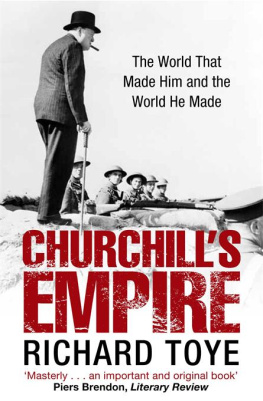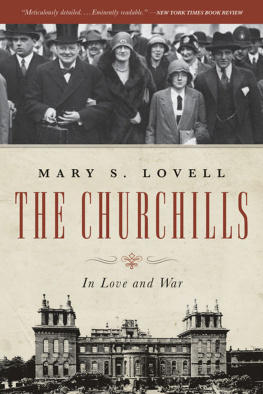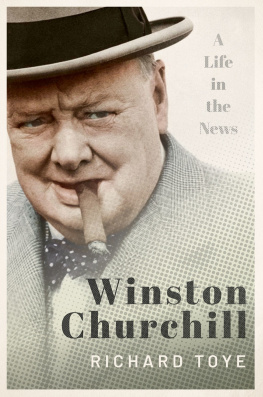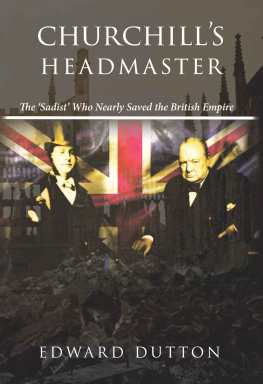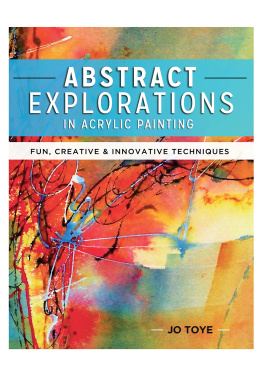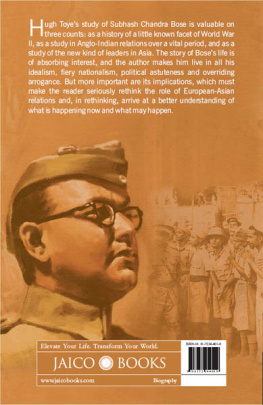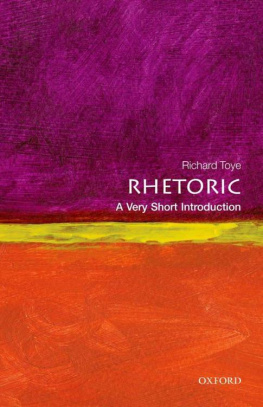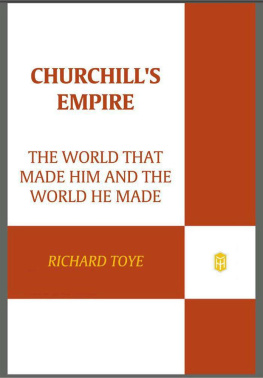Toye - Churchills Empire
Here you can read online Toye - Churchills Empire full text of the book (entire story) in english for free. Download pdf and epub, get meaning, cover and reviews about this ebook. publisher: Pan Macmillan, genre: History. Description of the work, (preface) as well as reviews are available. Best literature library LitArk.com created for fans of good reading and offers a wide selection of genres:
Romance novel
Science fiction
Adventure
Detective
Science
History
Home and family
Prose
Art
Politics
Computer
Non-fiction
Religion
Business
Children
Humor
Choose a favorite category and find really read worthwhile books. Enjoy immersion in the world of imagination, feel the emotions of the characters or learn something new for yourself, make an fascinating discovery.
Churchills Empire: summary, description and annotation
We offer to read an annotation, description, summary or preface (depends on what the author of the book "Churchills Empire" wrote himself). If you haven't found the necessary information about the book — write in the comments, we will try to find it.
Toye: author's other books
Who wrote Churchills Empire? Find out the surname, the name of the author of the book and a list of all author's works by series.
Churchills Empire — read online for free the complete book (whole text) full work
Below is the text of the book, divided by pages. System saving the place of the last page read, allows you to conveniently read the book "Churchills Empire" online for free, without having to search again every time where you left off. Put a bookmark, and you can go to the page where you finished reading at any time.
Font size:
Interval:
Bookmark:
Also by Richard Toye
LLOYD GEORGE AND CHURCHILL:
RIVALS FOR GREATNESS
Although he didnt like to do so, Mr Churchill ended the stage of the British Empire. That was not his subjective will. He said that to President Roosevelt. But objectively he ended the British Empire.
Chou En Lai to Henry Kissinger, 20 October 1971.
MACHINE GUNS
IN JUNE 1939 the MP and diarist Harold Nicolson attended a dinner at which Winston Churchill was the guest of honour. Also present was the celebrated American columnist Walter Lippmann. Lippmann told the assembled company that Joseph Kennedy, the appeasement-minded US ambassador to Britain, had informed him that war was inevitable and that the British would be licked. According to Nicolson, this reported defeatism prompted Churchill into a magnificent oration, during which he sat hunched, waving his whisky-and-soda to mark his periods, stubbing his cigar with the other hand. He did not deny that the coming war would bring dire peril and fierce ordeals, but said that these would merely steel the British people and enhance their will for victory. He addressed Lippmann:
Yet supposing (as I do not for one moment suppose) that Mr Kennedy were correct in his tragic utterance, then I for one would willingly lay down my life in combat, rather than, in fear of defeat, surrender to the menaces of these most sinister men. It will then be for you, for the Americans, to preserve and to maintain the great heritage of the English-speaking peoples. It will be for you to think imperially, which means to think always of something higher and more vast than ones own national interests.
Churchill reached a stirring peroration in which he envisaged the torch of liberty continuing to burn untarnished and (I trust and hope) undismayed. And then, as Nicolson noted laconically, discussion moved to the topic of the giant panda.
Churchills injunction to the Americans to think imperially was an echo of Joseph Chamberlains injunction to the British people It is possible to discuss his early influences with a little more precision than this. This chapter will explore how it was that Winston Churchill learnt to think imperially, a story that is more complex than is often assumed.
Churchills first public speech was made in defence of the Empire the Empire Palace of Varieties in Londons Leicester Square. It was November 1894. He was a cadet at the Royal Military College at Sandhurst and about to turn twenty. The theatre concerned was one of his favourite haunts, even though his beloved former nurse, Mrs Everest, had warned him against going there: it is too awful to think of, it can only lead to wickedness and everything bad. But the riot was to no avail: the barricades were soon built again in brick.
Churchills second speech, nearly three years later, was a rather more sober affair. It was to a Primrose League fte near Bath. The League was a national organization that aimed to marshal mass support for the Conservative Party. It was inclusive, insofar as working men (even if non-voters) and women could join, but also deeply hierarchical. (Churchill, who joined at the age of thirteen, achieved the rank of knight two years later.)
Much had happened to Churchill in the interval between these two speeches. In January 1895 his father, Lord Randolph Churchill, died at the age of forty-five from a degenerative illness, possibly syphilis, his once-stellar political career having long since imploded. Then, having received an army commission and following an adventurous trip to the United States and Cuba the younger Churchill had been posted to India. There he had helped while away the tedium with an ambitious programme of self-education, trying to teach himself what he thought he had missed out on by not going to university. It is tempting to explain the contrast between the Leicester Square high-jinks and the high imperialism of the Bath meeting (which Churchill addressed while home on leave) as a symptom of these developments. In this interpretation, Churchills new-found seriousness and direct experience of the Empire merged with a determination to vindicate his fathers memory and at the same time achieve political fame in his own right. Conviction, reinforced by a wide reading of authors such as Edward Gibbon, dovetailed with a self-interested realization that a young man could draw attention to himself through daring exploits in the farther reaches of the British-ruled world. There is plenty of truth to be found in this view which Churchill rather encouraged in his memoirs but it is not the whole truth. Although he may not have been fully aware of it himself, Churchills imperial consciousness began to form long before the autodidact phase of his early twenties.
As an adult, Churchill wrote that he had taken his politics almost unquestioningly from his father.
Lord Randolph applied himself more to high society than to the House of Commons, but he soon made a catastrophic social faux pas. His elder brother, the Marquis of Blandford, had an affair with Lady Aylesford while her husband was visiting India in 1875. Lord Aylesford wanted a divorce, which, if it went ahead, would drag Blandfords name into a public scandal. To avoid this, Lord Randolph pressed his friend the Prince of Wales to use his influence to halt the proceedings. Were this not done, he threatened to make public the Princes own indiscreet letters to Lady Aylesford. The Prince was naturally outraged at this attempted blackmail, and Lord Randolph was ostracized from society as a result. A kind of exile followed when the Prime Minister, Benjamin Disraeli, offered his father the Lord-Lieutenancy of Ireland, and Lord Randolph went with him as his private secretary. Winston Churchills first memory was of the Duke, his grandfather, unveiling a statue of the imperial hero, Lord Gough, in Dublins Phoenix Park. The statue is no longer there, removed following the IRAs attempts to blow it up in the 1950s.
Ireland was already troubled by violence during Winston Churchills childhood. Attempts at religious and educational reform by Gladstones Liberals had failed to quell a nationalist upsurge driven by economic distress and a sharp sense of resentment at British rule. The armed revolutionaries of the Irish Republican Brotherhood, often referred to as the Fenians, were not of the political mainstream but they conjured a fearsome reputation. My nurse, Mrs Everest, was nervous about the Fenians, Churchill recalled. I gathered these were wicked people and there was no end to what they would do if they had their way. Yet although Winston Churchill for some years shared his fathers opposition to Home Rule, he was to prove much more flexible once he became a minister. Although protective of his fathers memory, he did not adhere slavishly to his political positions.
In 1880 Disraeli was defeated at the general election and the Duke of Marlboroughs time in Dublin came to an end. The social boycott of Lord Randolph had eased, and he began to make his mark as a Tory MP. He led a small group known as the Fourth Party, attacking Gladstones Liberal government vigorously; he also fell out with the new leaders on account of his failure to toe the official party line. He became known as an advocate of Tory Democracy, a slogan Winston Churchill would adopt, although in Lord Randolphs hands it did not have much substance; some historians have accused him of inconsistency and opportunism. There was, however, something attractive in his very unpredictability, which extended to imperial issues, as the question of Egypt showed.
Egypt was part of the Ottoman Empire, ruled inefficiently by the Khedive, the Sultans representative, and was massively indebted to European bondholders. In 1882 Britain intervened to put down a nationalist revolt and thus protect her investments. After the rebels were defeated by her forces at the Battle of Tel-el-Kebir in September, real power in Egypt was exercised by the British, although the Khedive still owed nominal allegiance to the Sultan. To some it seemed a dirty business. Wilfrid Scawen Blunt, poet, horse-breeder, womanizer and adventurer, was the anti-imperialist in chief. (He is best known for his later verse riposte to Rudyard Kipling: The White Mans Burden, Lord, is the burden of his cash.)
Next pageFont size:
Interval:
Bookmark:
Similar books «Churchills Empire»
Look at similar books to Churchills Empire. We have selected literature similar in name and meaning in the hope of providing readers with more options to find new, interesting, not yet read works.
Discussion, reviews of the book Churchills Empire and just readers' own opinions. Leave your comments, write what you think about the work, its meaning or the main characters. Specify what exactly you liked and what you didn't like, and why you think so.

